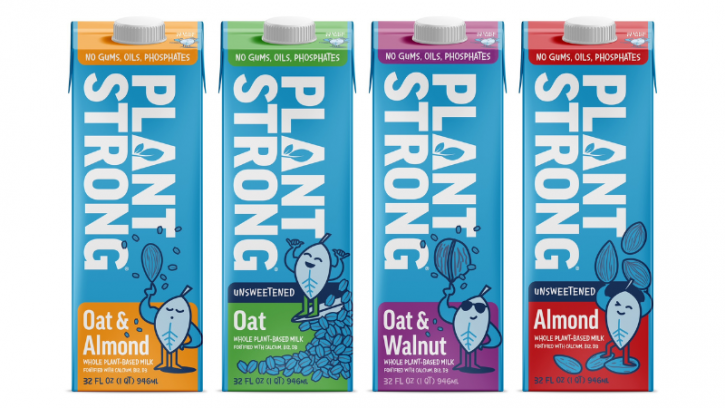PLANTSTRONG Foods finds whitespace for fortified plant-based milk, launches product in Whole Foods

“We are the exception to the rule at PLANTSTRONG, and we want to be a lighthouse for other brands that want to put a stake in the ground and stand for something more than just a product that people are going to buy because they love all the salt, sugar, and fat,” PLANTSTRONG’s founder and CEO Rip Esselstyn told FoodNavigator-USA. “We want to give people not only that taste without all the usual suspects, but we also want to give them a nutritional oomph like they have never seen in another packaged box or canned product.”
Fortifying milks to differentiate in the plant-based milk segment
Launched in 2021, PLANTSTRONG offers a range of clean-label, plant-based chilies, stews, granolas, burgers, and more recently, expanded into plant-based milk. The four shelf-stable plant-based milks are available in Unsweetened Almond, Unsweetened Oat, Oat & Almond, and Oat & Walnut varieties and are sold in more than 500 Whole Foods Markets nationwide and on the brand’s website.
Despite recent headwinds that are facing the liquid plant-based milk category and the animal-based milk market, PLANTSTRONG saw an opportunity to create a clean and nutrient-fortified milk, Esselstyn said.
Traditional plant-based products served as "a great stepping stone for a lot of people" to enter the category, but many consumers came to the "realization that these products in many ways are no healthier than their animal counterparts,” he explained. Consumers have also raised concerns about several key food additives, including gums, oils, and preservatives, and the lack of specific vitamins and nutrients in plant-based — in the case of milk, calcium, vitamin D, and vitamin B.
To address this, PLANTSTRONG has fortified its milks with 4.8mcg of vitamin D, 310mg of calcium, and 2.49 mcg of vitamin B12. Additionally, the Oat & Almond and Oat & Walnut milks use pulverized whole dates, which enhances the fiber content and adds vitamins, minerals, phytonutrients, and antioxidants to the product, Esselstyn said.
“We love producing something that does not come from a cow that comes from either oats or almonds, or walnuts, and that is super clean, fortified, and is also low cal. Our milk [has] anywhere between 40 to 50 calories per serving. So, that to me is a win.”
This is less than an eight-ounce serving of dairy milk, which has between 120-130 calories. Likewise, an eight-ounce serving of Oatly's 2% milk has 120 calories and an eight-ounce serving of Califia's Complete plant-based milk has 130 calories. Califia's unsweetened almond milk, however, has 60 calories per eight-ounces, and Silk's unsweetened almond milk has 30 calories per eight-ounce serving.
‘Do not judge a burger by its bag:’ Leveraging DTC to communicate with consumers
PLANTSTRONG is investing in its DTC channel, which has become a “testing platform” for new products, Esselstyn noted. Recently, PLANTSTRONG released its Skillet Burgers through DTC, available in Portobello Mushroom and Black Bean varieties, which sold out quickly, Esselstyn said.
“We are doing almost 4,000 orders a month on DTC, and so we have got this very, very loyal, robust audience and it keeps coming back for more and more. Many of them are subscribers to cereals like granola, pancakes, [and] the skillet burger. ... I could not be more proud of the products that we are pumping out, and we want the DTC side of the business to be a master brand for all things PLANTSTRONG. So, even though we are at 50 SKUs right now, we have no intention of slowing down.”
Due to a manufacturing error, the Skillet Burgers were accidentally placed in bags that were “eight sizes too big,” Esselstyn said. Instead of recalling the product, the company engaged the consumer through its DTC and digital channels and informed them of the mishap, he added.
“We reached out to our audience, and we [said,] ‘Listen, please do not judge a burger by its bag. Instead, let us know what you think of the product. We love your feedback. We love your participation.’ So, we engaged our audience,” Esselstyn said. “We did our greatest single day in sales ever with the launch of those two products, and we thought we had a three-month supply, [and] we ran out in three weeks.”















